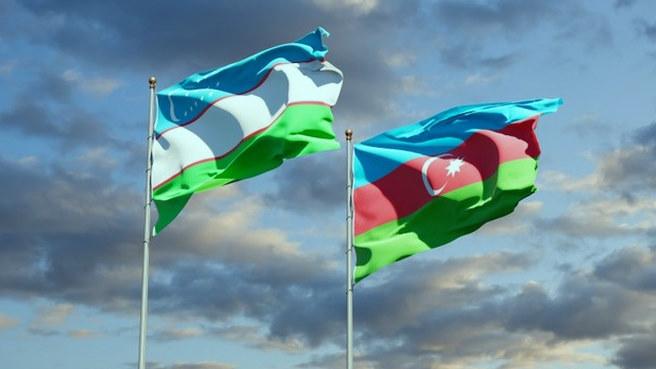Azerbaijan, Uzbekistan enhance cooperation Review by Khazar Akhundov
The large-scale reforms implemented in recent years in Uzbekistan and Azerbaijan, joint participation in regional transport projects, as well as the coincidence of interests of the two countries on most regional issues create objective conditions for expanding business cooperation between the countries. This trend has taken real shape in recent years through the implementation of joint projects in the automotive industry, agricultural sector, light industry, etc. Promotion of new business endeavours and coordination of the agenda of forthcoming forums were devoted to the visit of the delegation of the Ministry of Economy of Azerbaijan to Uzbekistan last weekend.
Nearly four years back, the economic relations between Azerbaijan and Uzbekistan were limited mainly to the participation of the two countries in the Silk Road transport projects, as well as developing commercial ties operating in a free trade regime, where, until recently, the Azerbaijani exports prevailed. Of course, the volume of trade and economic relations of Azerbaijan with its neighbours on the Caspian Sea - Kazakhstan and Turkmenistan - exceeded the corresponding indicators with Uzbekistan by many times. The latter is explained by the large-scale transhipment of hydrocarbon raw materials and non-resource goods (including transit) carried out between the ports of Baku, Aktau and Turkmenbashi, while the lack of direct access to the sea deprived Uzbekistan of such competitive advantages.
However, the situation has radically changed in recent years: thanks to market reforms and the policy of openness and regional integration pursued by Uzbek President Shavkat Mirziyoyev, the economic cooperation between Baku and Tashkent has also seen tangible positive growth dynamics. Thus, in 2017 Azerbaijan's trade turnover with Uzbekistan amounted to a relatively small $31.2 million. In 2018 it increased by more than 46%, and in 2019 by almost 60%.
A certain slowdown in trade dynamics was observed during the peak of the pandemic crisis in 2020, but in the next year, the countries managed to make up for lost time. In 2021 the trade turnover between the countries passed a landmark point of $100 million, having increased by a third, and this positive trend has generally been maintained in the first quarter of 2022, bringing trade turnover to $30.06 million.
However, the business ties between Azerbaijan and Uzbekistan are not limited to trade; in recent years, the activity of Azerbaijani entrepreneurs has significantly increased, mastering the promising and capacious market of this most populous Central Asian country. So, about 85 Azerbaijani companies operate today in Uzbekistan, and about 70 of them are joint ventures. The activities of these companies mainly cover trade and services, mechanical engineering and metalworking, finance and insurance, real estate operations, energy, food industry, light industry and jewellery production.

Uzbek business is also interested in the Azerbaijani market, and at the moment, mainly in Baku, there are about three dozen companies with Uzbek capital operating in the service, transit freight, trade and industry sectors. Two large Uzbek enterprises are worth mentioning among them: the representative office of Oʻzbekiston havo yoʻllari (Uzbekistan Airways) and Uzavto Baku LLC, the dealer centre of Uzavtosanoat SJSC.
Nevertheless, since the trade and investment potential of the two friendly countries is many times greater than the existing indicators, Baku and Tashkent intend to make maximum efforts to expand economic cooperation. During the recent summits of the Cooperation Council of Turkic Speaking States (CCTS), ministerial and interdepartmental meetings as well as several business forums, the two countries have agreed to implement a number of joint investment projects along with the expansion of trade.
The sides agreed on holding regular meetings of the joint Azerbaijani-Uzbek intergovernmental commission on economic cooperation as well as the Business Council scheduled for the second half of 2022 in Tashkent.
Such initiatives, in particular, were discussed during a meeting held last weekend at the Ministries of Investment and Foreign Trade of Uzbekistan: during the negotiations, Adviser to the Minister of Economy of Azerbaijan Emil Medzhidov and Deputy Minister of Investment and Foreign Trade of Uzbekistan Laziz Kudratov discussed the prospects of industrial cooperation, acceleration of investment projects and expansion of transport and logistics cooperation. The sides agreed on holding regular meetings of the joint Azerbaijani-Uzbek intergovernmental commission on economic cooperation as well as the Business Council scheduled for the second half of 2022 in Tashkent.
Judging by the recently formed bilateral investment portfolio and long-term plans, one of the key areas of business cooperation is the expansion of activities in the field of transport and logistics. Landlocked Uzbekistan is extremely interested in participating in transit routes to Turkey and Europe through Azerbaijan, and in recent years Uzbek cargo carriers have been actively using the potential of the Baku-Tbilisi-Kars railway corridor (BTC) and the Baku International Sea Trade Port in Alat.
In April 2022, the railway departments of the two countries created a working group to increase the transhipment of cargo, primarily container trains within the framework of the multimodal route "Asia-Pacific Region Countries - China - Kyrgyzstan - Uzbekistan - Turkmenistan - Azerbaijan - Georgia - Turkey - Europe". Last year, the volume of cargo transportation along this route doubled, and in 2022, Uzbekistan's industrial cargo was transited through Azerbaijan to Turkey: in January, a block train with fifty 40-foot containers with auto parts from the Asaka logistics centre followed the route.
In February, 62 containers with chemical industry products and fertilizers from Bukhara were passing through the route. Moreover, according to experts, container transit from Uzbekistan via the middle corridor will only increase, given the escalation of the transport and logistics confrontation between Russia and Europe.
Cooperation between the two countries in the agrarian and industrial spheres also looks very promising. "Azerbaijan and Uzbekistan plan to increase business ties through new directions. We consider textile, silk, leather and footwear, electrical engineering, and automotive industries as such promising industries," Uzbek ambassador to our republic Bahrom Ashrafkhanov noted recently. According to him, in September last year a joint venture (JV) "SamAuto" LLC, created by UzAuto Motors and Azermash JSC, was launched in the Hajigabul industrial district. In the first stage, the models Chevrolet Nexia and Chevrolet Cobalt will be assembled, and in the second stage - Chevrolet Damas and Chevrolet Labo with total quantity up to 5 000 units per year, and later models Chevrolet Onix and Tracker will be added to it.
Investment-technological cooperation between the two countries in the production and processing of agricultural raw materials is also seen as significant: in particular, the largest producer of cotton cleaning equipment in the region Uzbek company PAHTAMASH plans to build a factory for the primary processing of cotton in Azerbaijan and to assist in training highly qualified personnel in the cotton industry. In the future, PAHTAMASH is ready to equip the plants to be built in the Karabakh region.

In the first decade of May, during a meeting in Tashkent, the agrarian ministries of the two countries agreed to coordinate issues of food security, and exchange experiences in science and technology, including in cotton production. Thus, within the framework of agreements, Uzbekistan provides our country with seeds of high-yielding varieties of cotton, in turn, Azerbaijan assists in providing partners with seedlings of high-yielding varieties of hazelnut and in training Uzbek specialists in this sphere.
A very promising direction for the two countries is telecommunications and space research. In October last year, Uzbek Telegraph 42 Management GmbH signed a memorandum and joined TransCaspian Fiber Optic (TCFO) Azerbaijan-Kazakhstan initiative, which envisages laying a 380-400 km fibre-optic communication line under the Caspian Sea.
In the middle of May of this year, during the international conference Space Technology Conference STC-2022, space agencies of the two countries - "Azerkosmos" and "Uzbekkosmos" - inked a memorandum of cooperation. The parties intend to establish cooperation in the training and professional development of specialists, implement projects in the field of space technology and exchange experience in the introduction and regulation of space monitoring and GIS-centers. In this regard cooperation between Azerbaijan and Uzbekistan on Earth remote sensing with the use of resources of the Azerbaijani satellite "Azersky" is seen as very promising, including in agriculture, ecology, geological studies, tourism and a number of other areas.
About three years ago cooperation between Azerbaijan and Uzbekistan was established in the oil-gas and petrochemical sphere. Uzbekneftegaz and SOCAR state company reached an agreement on exploration projects in investment blocks in Uzbekistan and increase production in the Kashkadarya region, and respective road maps were signed. The State oil departments cooperate and consult in oil trading and production of oil and gas equipment and components. The countries also established cooperation in the non-ferrous metallurgy sector: since 2019, copper concentrate produced by Azerbaijani companies AzerGold CJSC and Anglo Asian Mining is exported to Uzbekistan.
Baku and Tashkent intend to strengthen cooperation to revive and expand tourist ties, which have considerably declined after the coronavirus pandemic. In particular, the plans of the State Tourism Agency of Azerbaijan and the Tourism Association (AzTA), as well as their partners in the State Tourism Development Committee of Uzbekistan include a number of measures to attract travellers, create joint tourism products, as well as measures to actively promote the tourism potential to increase the mutual flow of tourists. Apparently, this work is quite successful: only in April of this year, there was a 4.3-fold increase in visitors from Uzbekistan to our country.








